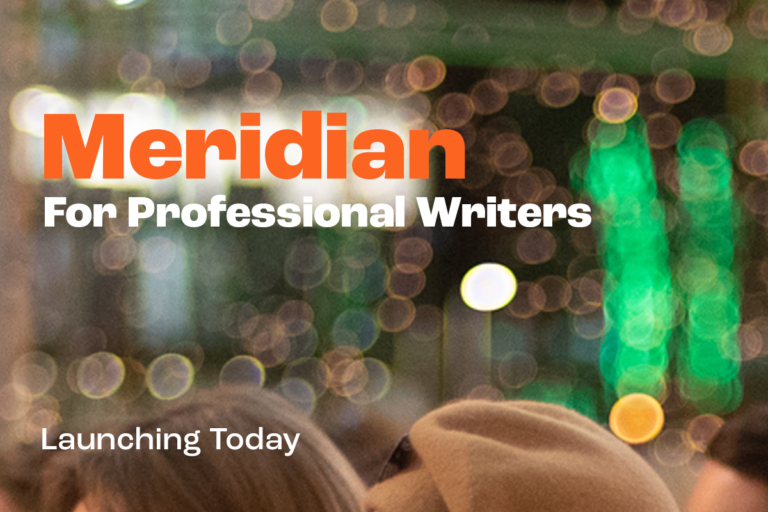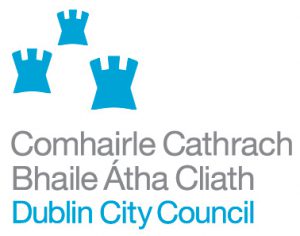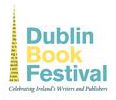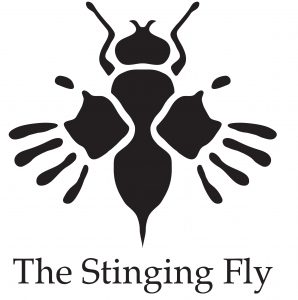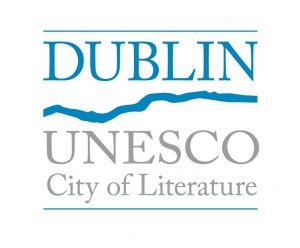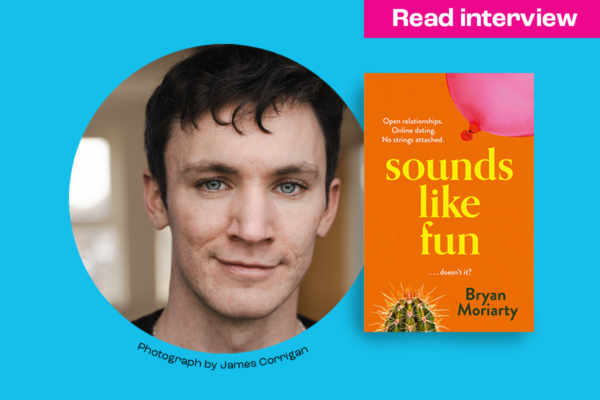
28 April, 2023
“I doubt I’d have ever found the confidence to put the book out there without the Novel Fair”: Interview with debut novelist and 2021 Novel Fair Winner Bryan Moriarty

Interviewer: Jack Delaney
Jack Delaney is a writer and theatre-maker from County Meath. He joined the Irish Writers Centre as an Arts Administration Intern at the beginning of March.
On the 29th of March, we were delighted to launch the 2024 Irish Writers Centre Novel Fair with an online panel discussion featuring Lauren Mackenzie, Gráinne Fox and Alan McMonagle, which is available to watch here. Now, in the first of a series of conversations with past Novel Fair winners, we have an interview with writer and 2021 winner Bryan Moriarty whose debut novel, Sounds like Fun, was published by Hodder & Stoughton on March 30th 2023.
Born in Dublin, Bryan studied at Trinity College Dublin before moving to London to pursue a career as an actor. In addition to performing in theatre, film and TV, he has written and produced several short films, plays and a web series. His debut novel, Sounds like Fun, has been praised by critics for its warmth and humour and has drawn numerous comparisons to Nora Ephron’s much-loved 1983 novel Heartburn. You can read an extract from Bryan’s novel here.
Bryan was kind enough to answer a few of our questions over email, filling us in on how he came to write the novel, what it was like pitching it to agents and publishers, and what advice he’d give to aspiring Novel Fair applicants.
“When I sat down to write my first book, I really wanted to focus on a relationship at a moment of crisis…”
Hi Bryan! Congratulations on the publication of your debut novel! Where did the idea for Sounds like Fun come from?
Thanks so much, Jack! When I sat down to write my first book, I really wanted to focus on a relationship at a moment of crisis, and what that crisis could reveal about my main character, as well as how it might change him. At the same time, I was meeting and hearing about various couples who were negotiating one version or another of a non-monogamous relationship, sometimes harmoniously and sometimes not. I was really intrigued to see how two people wanting different things out of their relationship might be a source of drama and (especially) comedy.
Sounds like Fun has arrived amidst a wave of new Irish romance novels written by men. What attracted you to the romance genre in the first place?
I’m not sure I consciously set out to write in a particular genre, but I was probably drawn to it because many of my favourite writers have focused on romance, even if their books aren’t always classed as Romance with a capital R. For example, David Sedaris writes with such humour and honesty about love, both romantic and familial. One of his essays is about his boyfriend lancing a boil on his lower back, and it’s probably my favourite piece of writing about love. I aspire to create something so gross yet beautiful, particular yet universal.
Writers often describe the period before a book comes out as both nerve-wracking and exhilarating. How have you found the lead-up to the release of Sounds like Fun?
In the best possible way, I feel slightly distant from it, because the last time I was deeply engaged with the actual text of the book was probably six months ago at this stage. Since then, I’ve been lucky enough to be able to hand it over to an amazing team at my publisher, who have done a wonderful job on packaging and spreading the word about the book. It’s been so lovely to hear anecdotes of booksellers and readers enjoying and recommending it, but I have to say, I’ve been planting my head in the sand a bit – I won’t be Googling my name or the book any time soon!
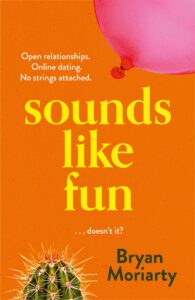
Front cover of Sounds Like Fun by Bryan Moriarty.
Published with Hodder & Stoughton 2023.
“The idea of being selected for the Novel Fair itself was obviously a big incentive, but not an outcome I thought was very likely!”
How did you hear about the IWC Novel Fair and what was it that made you want to submit?
I honestly can’t remember how I heard of the Novel Fair, but as soon as I did, I thought it would be a useful exercise. Since I knew my entry would be judged on a 10,000 word extract, it gave me the chance to polish one chunk of the novel, rather than agonising over the whole of it. The idea of being selected for the Novel Fair itself was obviously a big incentive, but not an outcome I thought was very likely!
How far along into writing your novel were you when you submitted to the Novel Fair?
I had written an extremely rough first draft in a month, then reworked it into a slightly more coherent second draft, but I had run out of steam by the time I entered the Novel Fair. I wasn’t totally sure how much work the book needed, or if anyone would be interested in it at the end of it all. Concentrating on the extract I was going to submit really helped to pull me out of that slump.
Did you have any prior experience of dealing with agents and/or publishers beforehand?
Absolutely none. I had submitted to plenty of new writing competitions, with stories, plays and short films, but I’d never been accepted by any of them, and the idea of approaching publishers seemed really intimidating. I doubt I’d have ever found the confidence to put the book out there without the Novel Fair.
“I practiced my fifteen-minute pitch with five or six friends in the weeks leading up to the fair…”
How did you find the experience of pitching your novel to industry professionals?
I honestly had a great time. I practiced my fifteen-minute pitch with five or six friends in the weeks leading up to the fair, all of whom asked really perceptive and challenging questions. By the time the event arrived, I wasn’t too worried about waffling or getting lost in what I was saying, and was just excited to talk about the book and learn a little about the editors and agents I’d be chatting with. It also helped that everyone I met over the two days was curious, encouraging and friendly. I was fairly exhausted by the end of it all, but really buzzing.
What were those first few weeks like after taking part in the Novel Fair?
I had the good fortune of signing with my agent, Laura Williams, quite soon after the Novel Fair. Laura had some suggestions on the manuscript, so those first few weeks were pretty hectic, because I was writing and re-jigging parts of the book before and after work. But I was, and remain, conscious that it was really a best-case scenario, meeting and speaking with people who knew publishing better than I did, and who had such insightful things to say about how the book could improve.
Can you tell us a bit about preparing the novel for publication? What was that process like?
The book changed a lot after Hodder bought it. My editor, Lily Cooper, had some really useful suggestions for filling out some of the characters and relationships, and for giving the story a clearer, more satisfying arc. That was both a challenge and a joy, because by then, I felt like I knew the characters and the world of the book so well that, once the structure became clear, it was easy enough to build on what was there.
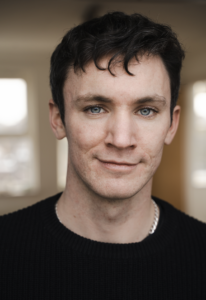
Headshot of Bryan Moriarty. Photograph by James Corrigan.
“If you’re midway through a first draft, and wondering if you’ll get to the end, I found it useful to allow myself to write badly.”
What advice would you give to someone currently in the middle of preparing their manuscript for the Novel Fair?
It depends on what the middle looks like. If you’re midway through a first draft, and wondering if you’ll get to the end, I found it useful to allow myself to write badly. In my first draft, the final chapter of the book was almost unreadably bad, but it at least allowed me to say that I had finished a whole book.
If you’re a few drafts in, I found it useful to focus on one section of the book (in my case the first 10,000 words) and to make that as polished as possible. I worked and re-worked the first few chapters – reading it out loud, reading it out of order, printing it out and seeing if that revealed something new, eventually sharing it with one or two friends to check that I hadn’t made some enormous mistake – and then, once I had submitted that much to the Novel Fair, I applied the same method to the rest of the book.
What do the next few months look like, now that Sounds like Fun is out?
I have a few readings and events coming up, which I’m really looking forward to, but aside from that, your guess is as good as mine! I’m going to be focusing on the next book, trying to get that up to scratch, and seeing where it takes me.
Sounds like Fun is out now with Hodder & Stoughton.
How to apply to the Novel Fair
Submissions to the Fair will be open throughout the month of September 2023 and will require applicants to submit a 10,000-word extract of the novel, as well as a 300 word plot synopsis. The twelve successful applicants will be informed at the beginning of December – giving them a week to submit their full 50,000 manuscripts – and will be given the opportunity to attend a day-long ‘How to Pitch Your Novel’ seminar in advance of the Fair itself, which will take place in the spring.
Find out more about the Novel Fair here.

